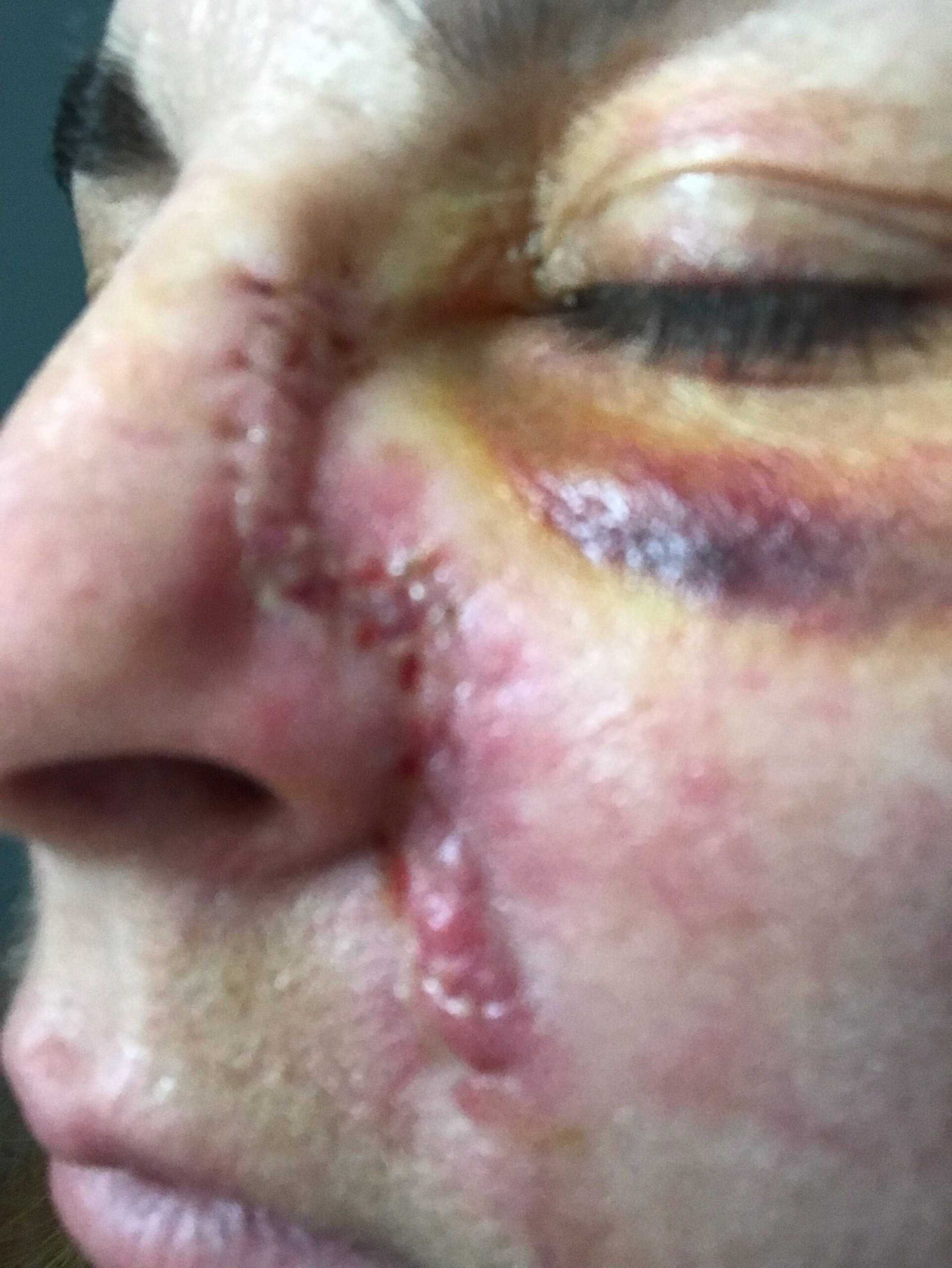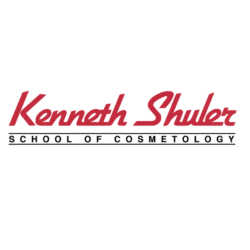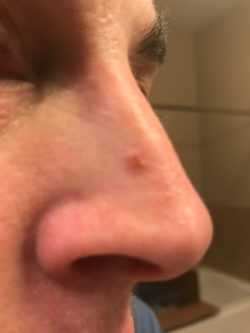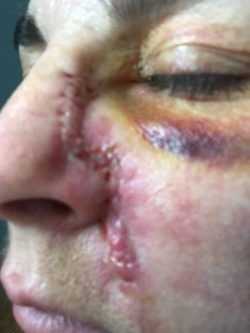Skinny On Skin Spotlight: Kenneth Shuler School for Cosmetology’s Colleen Large

 The Skinny On Skin is a program IMPACT Melanoma launched to aide stylists, estheticians, nail technicians, bodyworkers, and other health and skin professionals as a training aimed to educate these frontline professionals to recognize suspicions lesions on their clients’ skin and encourage their clients to seek medical care as needed from a dermatologist or other health professional for an official diagnosis in a further effort to combat skin cancer diagnoses nationwide. Using an eLearning lesson, the training is digital and can be found here on our website. That said, we encourage this sort of thing to anyone with an interest and, lucky for us, there are interested, kind and passionate people who do just that.
The Skinny On Skin is a program IMPACT Melanoma launched to aide stylists, estheticians, nail technicians, bodyworkers, and other health and skin professionals as a training aimed to educate these frontline professionals to recognize suspicions lesions on their clients’ skin and encourage their clients to seek medical care as needed from a dermatologist or other health professional for an official diagnosis in a further effort to combat skin cancer diagnoses nationwide. Using an eLearning lesson, the training is digital and can be found here on our website. That said, we encourage this sort of thing to anyone with an interest and, lucky for us, there are interested, kind and passionate people who do just that.
Today we’d like to highlight one such partner in prevention, Colleen Large of Kenneth Shuler School for Cosmetology in South Carolina. Read on to learn how Colleen got involved with IMPACT and what her thoughts are on the benefits of the Skinny On Skin program.
Tell us about your role as the Corporate Education Leader of Esthetics at the Kenneth Shuler school for Estheticians in South Carolina. What does the day-to-day entail? What do you enjoy about your work?
As the Director of Esthetics Education at Kenneth Shuler, I oversee all aspects of the program from curriculum to staff training, for our Esthetics Instructors and key Cosmetology Instructors to act as “crossover” personnel, when needed. My day to day may consist of rewriting curriculum and procedures to suit industry advances and/or traveling to all of our Statewide campuses to train current and new staff.
How’d you learn about IMPACT Melanoma? Tell us about the initial engagement with the team.
I learned about IMPACT Melanoma while registering for the Atlanta Face and Body Show in March of 2019. I added the Skinny On Skin class to my registration and was very pleased with the presentation. I knew immediately that I wanted to bring it into the school and reached out to IMPACT Melanoma to find out what we could do to kick it off for Skin Cancer Awareness month, just a few weeks later. I was put in touch with Amy Mason who was very helpful in facilitating the kick off and the response in the schools was great! We purchased the, “I love protecting my skin” t-shirts and gave them to students who completed the Skinny On Skin eLearning course during the month of May. We continued to give shirts out while they lasted into the month of June and all students were allowed to wear their t-shirts on Fridays to encourage others to complete the course.
You’ve been actively working with IMPACT’s Skinny On Skin eLearning course and positioning it throughout eight campuses around South Carolina. That sounds like a big undertaking. Why is this work important?
The subject of skin cancer awareness has been an important part of my focus for decades. It was about 20 years ago that I recognized a suspicious lesion on a client in her 30’s. I recommended she see a dermatologist and she was diagnosed with melanoma weeks later. It has been what I have deemed and preached as our professional responsibility ever since. I love that the Skinny On Skin program speaks to us as a profession. As an esthetician for over 30 years, the skin has always been my immediate focus. This program speaks to our esthetics students, but also includes the cosmetology students we have in our schools. So often, they are only concerned with the hair, and this speaks to their responsibility to also look at the skin, and have the conversations they aren’t use to having.

Suspicious lesion prior to surgery

After surgery
What do you appreciate about the Skinny On Skin program?
Since last year’s kickoff, I have built the Skinny On Skin eLearning course into our curriculum. Every Esthetics student is assigned to complete the course during our chapter that covers skin cancer lesions. They love it! We even sometimes teach to the student who doesn’t know the dangers of unsafe sun and tanning practices, so the program not only teaches them to recognize suspicious lesions on their clients, but also changes their thoughts about their own healthy choices. Win-win!
To date you’ve facilitated over 100 Skinny On Skin trainings. What have you learned from this collective experience? How have the students responded? What has the feedback been like?
My personal story is one that I allow my instructional staff to share with students and I have documented with pictures of my own skin as I progress through treatment. Although my skin cancer was not melanoma, it was an aggressive Basal cell carcinoma on my face, so my scar is easy to show students how disfiguring even the least dangerous form of skin cancer can be. I grew up in a beach town during a time that sun protection wasn’t a thought, and even though I have taken really good care of my skin, I was also an esthetician when the tanning beds hit our market as “safe sun” and use was, unfortunately, common practice for even skin care professionals.
What is your own personal philosophy in regard to sun safety? Tell us your “survival story.” Why does this sort of programming/initiative hit home?
My personal motto is, “trust me on the sunscreen.” My message is everyone, unless they live and work in a cave without windows, needs sunscreen every day, no matter their natural shade of skin. Unless their tan was rubbed or sprayed on, any color they weren’t born with is their body’s cry for help after sun damage has occurred.
What sort of impact does this program leave on your direct community, and, in turn, an extended network/community?
The impact of this campaign, along with my personal story, has been one of changed perceptive. In the South, education about safe sun protection is still lacking. Every one person educated can be one person saved, and although one person at a time is slow, it is steady.
What’s your battle cry sound like with regard to getting surrounding communities, cosmetology schools, salons, etc., in your area, and across the globe to adopt a similar proactive approach to helping combat skin cancer?
As licensed skin care professionals, making live saving prevention our goal lends credibility to education and what we can do to protect the people in our chairs. We do so much more than put on eyeshadow. We have the ability to save lives through education, prevention, and recognition of when to refer to a physician.
###
It’s strong advocates like Colleen that are helping us to collectively make a great IMPACT in communities around the United States and beyond. Consider getting involved. If you’d like to take the course or become a Skinny On Skin Ambassador visit impactmelanoma.org.

